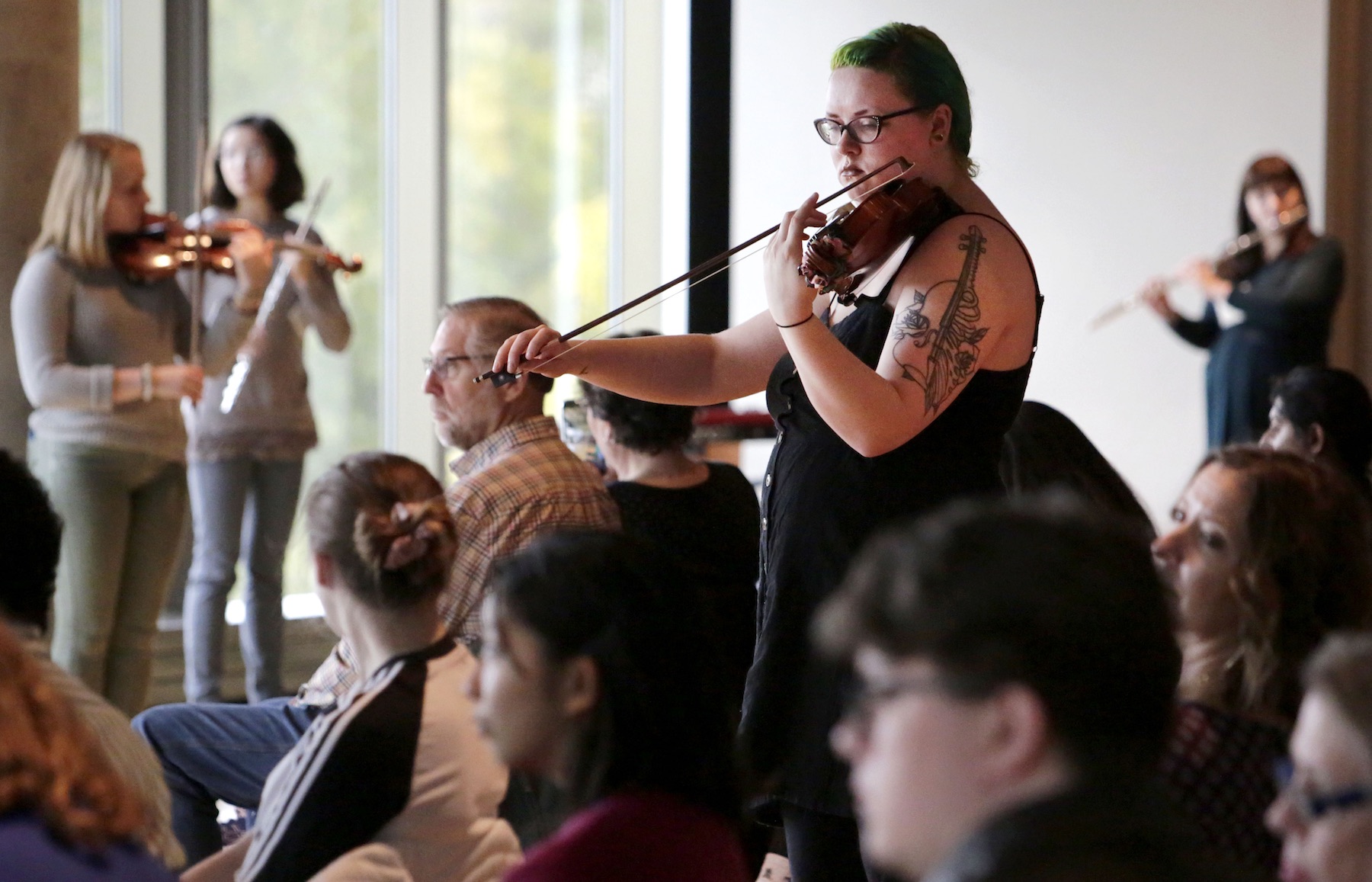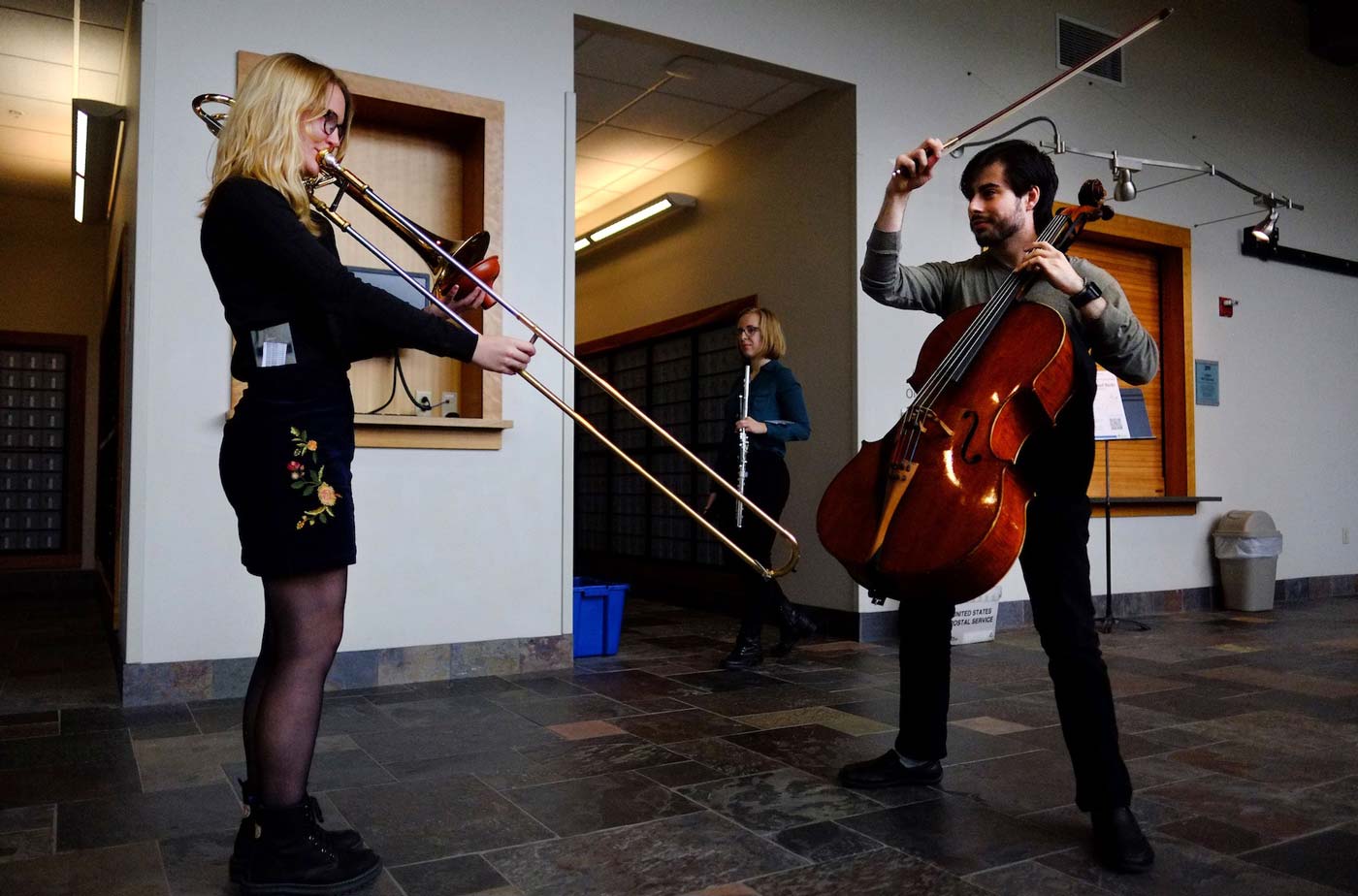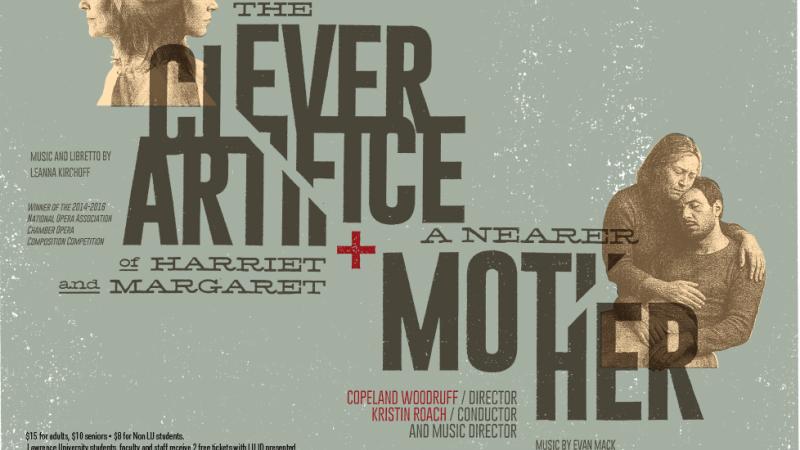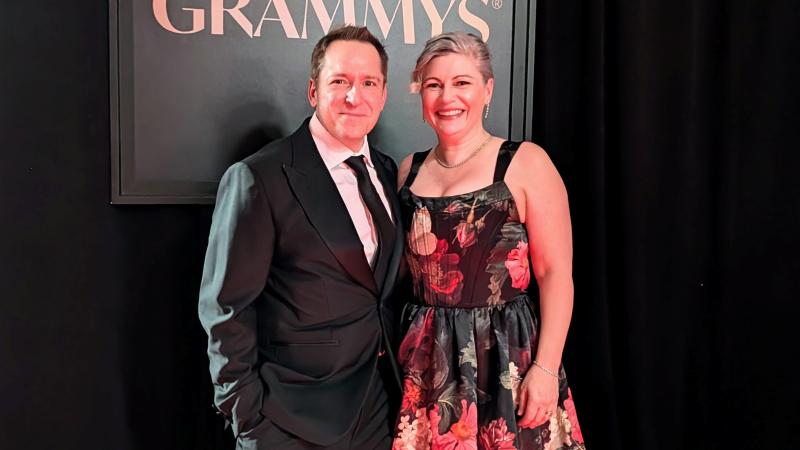Julian Bennett ’20, a cello performance major, called it “something out of a storybook.”
He and the other musicians in the Lawrence University New Music Ensemble were performing Ten Thousand Birds, creating music inspired by bird calls and interacting with the audience in the natural settings of the Green Bay Botanical Gardens.
“At one point I had about five ladybugs on my cello as I was playing and all the birds in the garden were singing back at us,” Bennett said.
The magical experience — in addition to the botanical gardens performance, the ensemble had a performance at Lawrence that was moved indoors because of bad weather and a public rehearsal at Bjorklunden in Door County — was among the highlights of fall term in the Lawrence Conservatory of Music and shined a light on the possibilities that come with participation in the New Music Ensemble.
We caught up with students who took part in the Ten Thousand Birds performances to talk about what they took from the experience — performing music based on Midwestern animal sounds and bird calls, playing while walking in and around the audience, and exploring the nature around them.

“Ten Thousand Birds” is performed Oct. 13 in the Warch Campus Center. It was moved indoors due to inclement weather. It also was performed outdoors at the Green Bay Botanical Gardens and at Bjorklunden in Door County. (Photos by Danny Damiani)
Zoe Markle ’20, a bass performance major, said her playing was directly affected by these “interactions with the audience” as well as those with the environment around them and believes that in the end the musicians “were as much a part of the piece as the music.”
Because the structure of this particular piece is left up to the musicians and based largely on improvisation, how the audience reacts and interacts can change the music.
“It was always fascinating to hear how the performances would differ from each other, and what melodic lines I would hear that I hadn’t heard before,” percussion major Alex Quade ’20 said.
Learning and rehearsing Ten Thousand Birds was unlike any process the students had experienced, though each piece they learn in the New Music Ensemble provides a new and different learning challenge. Because the work is constructed on a timetable, there is no mapped-out score. Every sound comes in at a different timing.
For these performances, the directors of the ensemble, visiting assistant professor of entrepreneurial studies and social engagement Michael Clayville and associate professor of music Erin Lesser, decided to arrange the piece in a day-long journey, placing the sounds one would typically hear at different times of the day. Both professors are part of the award-winning contemporary ensemble Alarm Will Sound, which has performed the piece in this arrangement several times.
“We rehearsed the piece by sound and were split up into small groups for many rehearsals, rather than working as a whole,” Markle said.
This small group work is a major draw for students participating in the New Music Ensemble, she said.
Markle noted that a huge reason she joined the group was because she loves “to perform in smaller chamber ensembles” as she is “able to connect more on an individual level with all the members of the ensemble.”

Erin Ijzer and Julian Bennett perform “Ten Thousand Birds” in the Warch Campus Center.
Ten Thousand Birds is a piece by Pulitzer Prize-winning composer John Luther Adams that was commissioned for Alarm Will Sound. The work is a collection of bird calls and animal sounds that can be found in the Midwest and takes the form of a folio, each page of notated animal sounds separate so that the musicians can arrange them whichever way they like. If Ten Thousand Birds is performed outside the Midwest, it can be updated to feature the animal sounds of that region.
The work was initially introduced to Lawrence’s ensemble by Clayville and Lesser last spring when they asked if students would be interested in playing outdoors. The response was a unanimous yes.
Helen Threlkeld ’23, a flute performance and biology double degree student, explained that it was an especially cathartic experience for her, having grown up embracing nature.
“I’ve always been really inspired by music that is tied to the outdoors,” she said, “but I’ve never played music that tries to emulate the outdoors.”
As a flutist, playing bird calls was especially exciting for Threlkeld, who explained that “a lot of composers have used bird song as inspiration, like Prokofiev’s Peter and the Wolf,” but she notes that no composer has done what Adams has by notating them directly into playable notation.
Before bringing Ten Thousand Birds to Lawrence and the Green Bay Botanical Gardens, the New Music Ensemble traveled to Björklunden, the university’s retreat campus on the Door County banks of Lake Michigan. The group rehearsed outdoors in the woods surrounding the main lodge to get a feel for playing in nature and to bond as an ensemble.
During the rehearsal, Threlkeld also realized how much the environment played a part in the piece.
“The waves coming up on the shore created a soundscape that sort of enveloped all the performers,” she said.
During the community performance at Björklunden, she said she experienced the power of the piece and described a moment where she “lost all passage of time” while they were playing.
The ensemble also pushes students to develop new skill sets within their musicianship. During the Ten Thousand Birds experience, students were encouraged to improvise, choosing the times they would play and how they responded to other players.
Thelkeld noted the difference in thinking about this contemporary piece and traditional classical music. She’d often think hard about “what the composer wanted” when learning a piece. That was flipped this time, she said.
“I had more of a chance to use my own judgment and use my own responsibility as a musician to create an experience for the audience instead of worrying about ‘what did Mahler’ or ‘what did Dvorák think?’”
Alarm Will Sound came to Lawrence for a residency last year and opened up their rehearsals to members of the New Music Ensemble, challenging them to sight-read through one of the pieces they were working on. It tied in with the ensemble’s mantra to push musical boundaries.
Quade called the experience “invaluable,” emphasizing how important it is to take advantage of “the opportunity to rehearse, interact, and learn” from groups that come in.
“Having these connections, along with every Lawrence professor, is such an asset that everyone needs to take advantage of,” Quade said.
Being part of the New Music Ensemble is pushing the participants to become better listeners and communicators, and the deep connections they’ve made with faculty is changing the way they play and collaborate.
The success of Ten Thousand Birds bodes well for this ensemble, which will have more performances and a guest artist residency in the spring.




